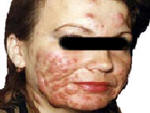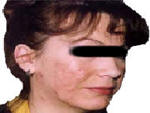Acne
treatments and pimple cures
Acne is a cruel disease, and UV phototherapy light
treatment is technically proven to reduce the severity of
the condition in most cases, by killing the bacteria that
cause the acne infections. You will find many leading
dermatologists recognize the benefits of UV phototherapy
treatment, but it is only recently available for home and
personal application. Phototherapy does not just treat the
symptoms, it addresses the causes of acne (bacterial
infection.) Below we have listed some drugs used to treat
Acne, and the not so known side effects.
"The fact that up to 70 percent of patients with acne
report significant improvement of their skin condition after
exposure to the sun during the summer months points to the
potential value of phototherapy for acne... Efficacy has
been reported with both of these approaches in treating
moderately severe acne and is thought to be derived from
combined anti-inflammatory and anti-bacterial actions...
Radiation therapy (phototherapy) remains an option for acne
management..." From The Dermatological Times.
| |
|
 |
 |
|
acne before UVA
phototherapy |
acne after UVA
phototherapy |
| |
|
Roaccutane in Australia (Accutane in USA)
Commonly hailed a an "Acne cure." This is possibly the
closest drug that we have to a cure, but it is drastic,
severe and has many side effects. Roaccutane (or Accutane in
USA) works by causing oil glands in the skin to shrink. The
theory being less oil glands, means less oil, and less
infections caused by bacteria in the oil. Roaccutane has
been proven to cause baldness and hair loss. Roaccutane is
indicated for the treatment of severe recalcitrant nodular
Acne. Nodules are inflammatory lesions with a diameter of 5
mm or greater. The nodules may become suppuratives or
hemorrhagic. "Severe," by definition means "many " as
opposed to "few or several" nodules. Because of significant
adverse effects associated with its use, Roaccutane should
be reserved for patients with severe nodular Acne who are
unresponsive to conventional therapy, including systemic
antibiotics. Roaccutane causes sever foetal malformations
and MUST never be used when pregnant and users MUST not
become pregnant while on this drug. Side effects include
visual disturbances, hearing deficiency in certain
frequencies, as well as headache, nausea, malaise and
drowsiness, depression psychosis and. rarely, baldness and
hairless, suicidal ideation, suicide attempts and suicide,
dryness of the mucosa, which on the lips can be relieved by
application of a fatty ointment; dryness of the nasal mucosa
can lead to epistaxis; dryness of the pharyngeal mucosa to
hoarseness, dryness of the eyes can cause conjunctivitis,
muscular and joint pains, premature epiphyseal closure and
skeletal hyperostosis, anaemia, neutropenia and
thrombocytopenia and severe vomiting. In most instances
Roaccutane comes with a warning and disclaimer form that
must be signed before being given the drug, acknowledging
the drug has many dangerous side effects!
Benzoyl peroxide (topical)
As it's name suggests, Benzoyl peroxide is a powerful
BLEACHING agent, it is somewhat successful in killing the
bacteria and reducing most Acne conditions, but it comes
with many warnings and some lesser know side effects. You
may as well apply diluted chlorine on your skin. After the
first few days of use patients notice redness and scaling of
the skin this can be reduced by using a less concentrated
solution or not applying as often. It will bleach clothes
and hair so if applying to chest and back wear old clothes.
Side effects include; painful irritation of skin, including
burning, blistering, crusting, itching, severe redness, or
swelling; skin rash, burning, itching, scaling, redness, or
swelling of skin (severe,) dryness or peeling of skin (may
occur after a few days); feeling of warmth, mild stinging,
and redness of skin. It has been proven that Benzoyl
peroxide is absorbed through your skin into your blood,
causing strain to internal organs such as liver and kidneys.
It has not been widely tested on children or pregnant women.
You can read more about this drug and its side effects at
the US government's drug information web page at;
more Benzoyl peroxide information here
salicylic acid (topical)
Salicylic Acid is a relatively new Acne treatment applied
as a cream once or twice a day for a maximum of six months.
It is used to treat mild to moderate Acne and is as
effective as Benzoyl peroxide, erythromycin cream or oral
tetracycline against troublesome skin bacteria and
comedones. A small percentage of users may notice redness of
the skin. It is also used to treat, dandruff, psoriasis,
seborrheic Dermatitis of the skin and scalp, calluses,
corns, common warts, and plantar warts, depending on the
dosage form and strength of the preparation. Side effects
include; confusion; dizziness; headache (severe or
continuing); rapid breathing ; ringing or buzzing in ears
(continuing.) It has been proven that Salicylic Acid is
absorbed through your skin into your blood. It has not been
widely tested on children or pregnant women. You can read
more about this drug and its side effects at the US
government's drug information web page at;
more Salicylic Acid information here
differin
Defferin is the drug found in Adapalene gel. Adapalene gel
is a topical retinoid-like drug for the treatment of mild to
moderate Acne vulgaris. Adapalene is more effective than
some topical drugs as it penetrates deeply into the hair
follicle. Adapalene possesses potent anti-inflammatory and
comedo lytic properties . Adapalene is used when comedones,
papules and pustules predominate (white heads.) Side effects
include; burning sensation or stinging of skin; dryness and
peeling of skin; itching of skin; redness of skin and
worsening of the acne. It has not been widely tested on
children or pregnant women. You can read more about this
drug and its side effects at the US government's drug
information web page at;
more Defferin / Adapalene information here
UVB light treatment
UV phototherapy is extremely efficient acne treatment.
particularly UVA that killing the bacteria that cause acne
infections providing long term relief. UVA light is proven
more effective for this than UVB, however a combination as
found in our UV-Buddy is more ideal. UVB light can be
harmful if misused. We recommend speaking with a doctor to
ensure UVB light treatment is suitable for your condition.
You can order our home personal treatment here with our
online orders.
Other acne treatments
Doctors may use other types of procedures in addition to
drug therapy to treat patients with acne. For example, the
doctor may remove the patient's comedones during office
visits. Sometimes the doctor will inject Hydrocortisone
directly into lesions to help reduce the size and pain of
inflamed cysts and nodules.
Early treatment is the best way to prevent acne scars. Once
scarring has occurred, the doctor may suggest a medical or
surgical procedure to help reduce the scars. A superficial
laser may be used to treat irregular scars. Another kind of
laser allows energy to go deeper into the skin and tighten
the underlying tissue and plump out depressed scars.
Dermabrasion (or microdermabrasion), which is a form of
"sanding down" scars, is sometimes combined with the
subsurface laser treatment. Another treatment option for
deep scars caused by cystic acne is the transfer of fat from
one part of the body to the face.
Source: National Institute of Arthritis and Musculoskeletal
and Skin Diseases.
Acne is the term for pimples and complexion problems which
occur in young people and some adults. Inflammation of the
oil glands in the skin due to an over sensitivity to the
normal level of hormones in the body. Pimples usually occur
on the face but can occur anywhere.
What general treatment is available for acne?
Acne is often treated by dermatologists (doctors who
specialize in skin problems). These doctors treat all kinds
of acne, particularly severe cases. Doctors who are general
or family practitioners, pediatricians, or internists may
treat patients with milder cases of acne.
The goals of treatment are to heal existing lesions, stop
new lesions from forming, prevent scarring, and minimize the
psychological stress and embarrassment caused by this
disease. Drug treatment is aimed at reducing several
problems that play a part in causing acne: abnormal clumping
of cells in the follicles, increased oil production,
bacteria, and inflammation. Depending on the extent of the
person's acne, the doctor will recommend one of several
over-the-counter (OTC) medicines or prescription medicines
that are topical (applied to the skin) or systemic (taken by
mouth). The doctor may suggest using more than one topical
medicine or combining oral and topical medicines.
Source: National Institute of Arthritis and Musculoskeletal
and Skin Diseases
NOTE: The most recent wide spread treatment for acne is wide
band UVA light as used in major hospitals and clinics in
Australia, Europe and the UK.
Products for the treatment of acne
We offer a variety of products for treatment of acne.
Please click here to see all
products or here for the
Dermalight80 for spot treatment of acne (requires UVA.) |